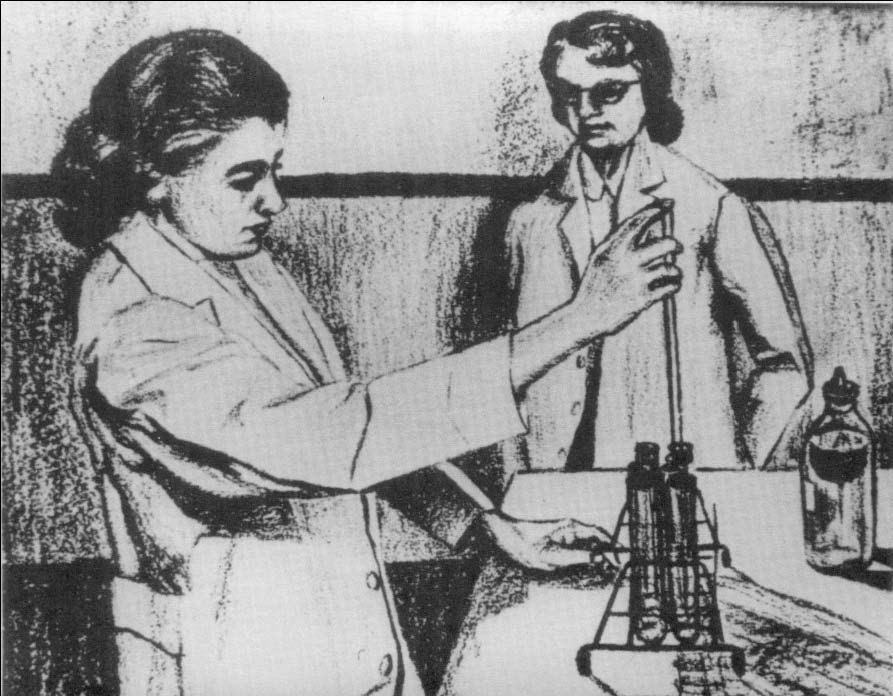The picture you were asked to describe came from the Thematic Apperception Test, or TAT. The purpose is to see how individuals reveal parts of their own personalities while looking at an ambiguous picture. The words that you used were analyzed using the LIWC (Linguistic Inquiry and Word Count) program developed at the University of Texas and University of Auckland in New Zealand. If you would like to get more information on LIWC, go to www.liwc.net.

The TAT was originally designed to determine the degree to which people wrote about themes relating to achievement, affiliation, and power. Although there are a series of different TAT pictures, this one is somewhat related to each of these themes -- although most people make up a story with achievement themes. For example, some people emphasize the nature of the experiment or scientific discovery (reflecting the writer's interests in achievement and success); others may focus on the nature of the friendship between the two women (interests in affiliation); yet others may focus on the status differences of the two women (reflecting the writer's concerns with status and power); By analyzing the words that you use, we can get a rough sense of your interest in each of these themes.
Here is a short analysis of your word use. Keep in mind that the more words you wrote, the more trustworthy these analyses. If you feel that your writing didn't reflect who you really are, go back and start over. At the same time, don't take these results too seriously.
Need for Achievement. The typical person generally scores between 4.5 and 8.5, with an average of 5.7. The higher your number, the more you wrote about achievement-related themes.
Need for Affiliation. Because this picture typically elicits themes associated with achievement, most people don't pay too much attention to human relationships in their story. In fact, the typical person scores around 1.2 on this dimension. Indeed, 30% of participants score 0.00.
Need for Power. Most people score between 0.8 and 2.7, with the average being 1.7. High scores on the need for power dimension hint that the writer is concerned with who is or is not in control andwho has the most status.
One thing that is interesting about this kind of exercise is that language analyses can tell us many things about the writer that go far beyond power, achievement, and affiliation. Look at the table below. In it, you can determine some features of your own writing and can get a sense of your writing style compared with others:
Self-references: People who use a high rate of self-references tend to be more insecure, nervous, and possibly depressed. They also tend to be more honest.
Social words: Social words are words that make reference to other people (e.g., they, she, us, talk, friends). Generally, people who use a high level of social words are more outgoing and more socially connected with others.
Positive emotion words: The more that people use positive emotion words (e.g. happy, love, good), the more optimistic they tend to be. If you feel good about yourself, you are more likely to see the world in a positive way.
Negative emotion words: Use of negative emotion words (e.g., sad, kill, afraid) is weakly linked to people's ratings of anxiety or even neurotic. People who have had a bad day are more likely to see the world through negatively-tinted glasses.
Big words (words with more than 6 letters): Use of big words is weakly related to higher grades and standardized test scores. People who use a high rate of big words also tend to be less emotional and oftentimes psychologically distant or detached.
The Big Picture: The above interpretations should be considered with a grain of salt for your own writing. Your approach to the assignment may have been influenced by people bothering you, concerns about other things in your life, lack of sleep, etc. In addition, it is important to remember that the TAT is generally administered in a highly controlled situation and is always graded by a real-live human being. You will recall from the book that the TAT was devised to tap people's needs for achievement, power, and affiliation. Look at your own writings and see if you can pick up if you were in high in these motives. For example, if you said that one person was thinking about her future career, a TAT expert would probably say that you were higher in a need for achievement than if you said that the person was thinking about her lover (which would hint that you were higher in need for affiliation).
| Date/Time: | 30 January 2026, 2:05 am |
Your TAT description: